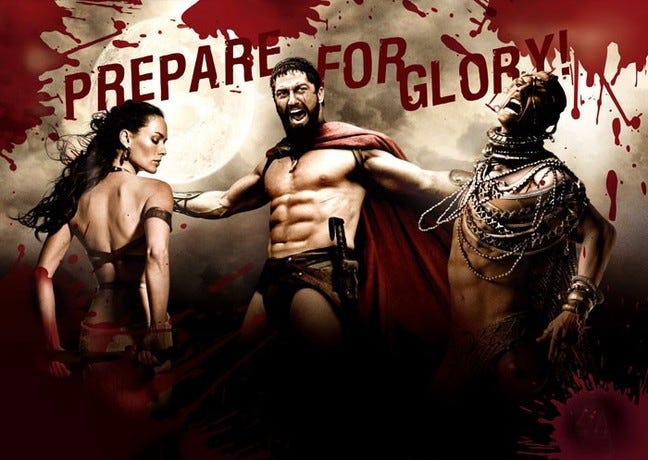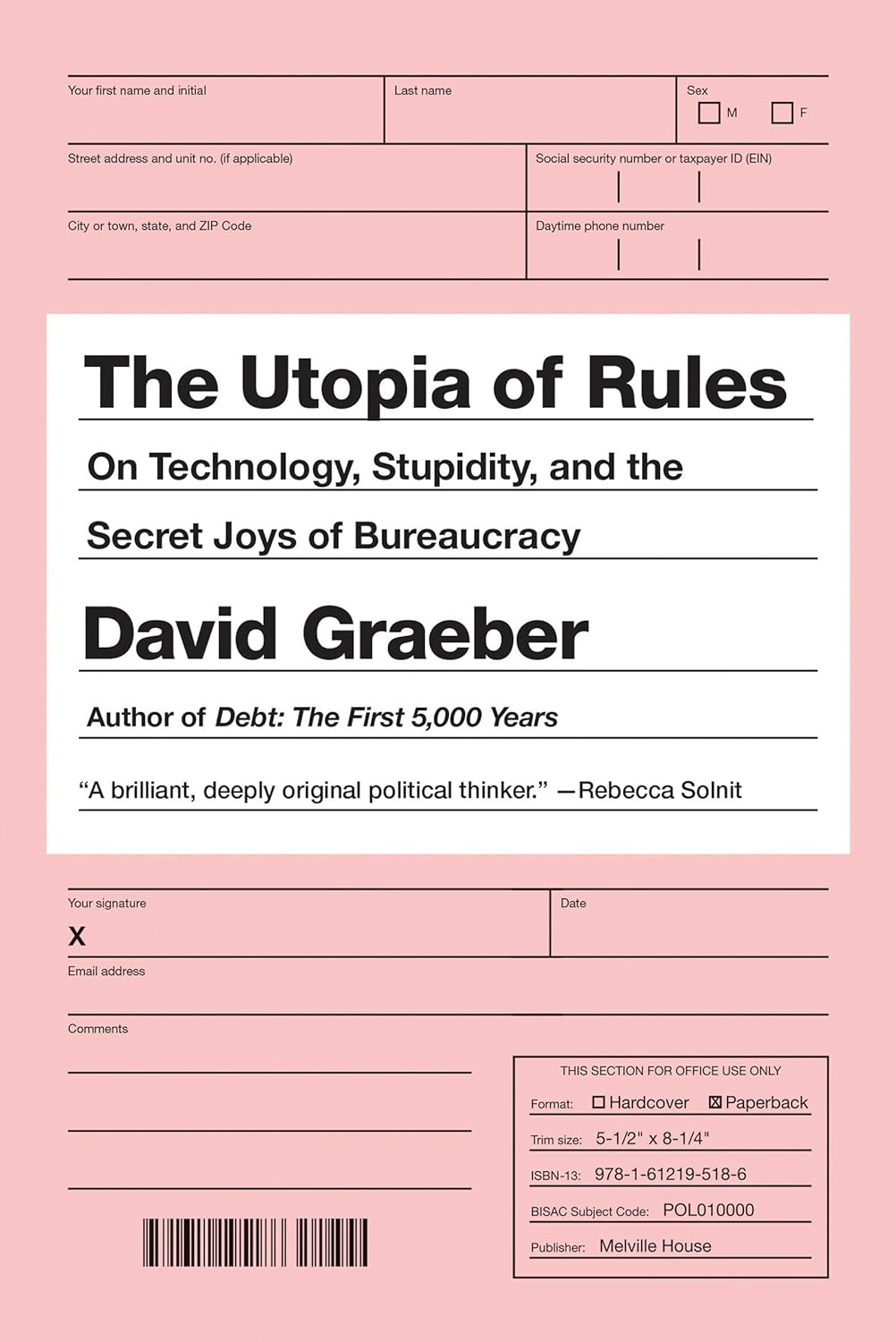In Canada today, the federal bureaucracy has swelled to over 365,000 direct employees—a 40% increase in just ten years. This is the largest bureaucracy, relative to population, that Canada has ever known, perhaps the world. Factor in provincial and municipal bureaucracies, consultants, and contractors, and the sheer weight of government payroll becomes staggering.
The chaos south of the border, the looming reality of Canada’s productivity failure, our pressing need to get to work and get creative - to grow, make, and do for ourselves - will soon bring a new government of 338 elected representatives face to face with the biggest, most activist, wealthy, powerful, and uncontrolled bureaucracy Canada, and maybe the world has ever known. Their one task? To change the way this bureaucracy works.
In 300, a small band of Spartan warriors faces off against the massive Persian empire, standing their ground in a seemingly impossible battle. They fight not for victory, but for the idea that resistance matters—that courage and discipline can inspire something greater, even in the face of overwhelming odds.
Canada’s next government will face its own impossible battle: 338 elected representatives standing before the towering, entrenched bureaucracy that has swollen to historic proportions. Can they change its course? Can they shrink it? Or will they be ground down, outnumbered and outmaneuvered, by the very machine they are meant to command?
Like the Spartans at Thermopylae, they will find the enemy is not just in front of them but within their own ranks. Bureaucratic inertia, public-sector unions, and political self-preservation will ensure that any attempt at reform is met with fierce resistance. History suggests the outcome: those who challenge the system will be sacrificed, while the machine grinds forward, larger and more powerful than before.
The Spartans lost at Thermopylae, but their stand awakened a nation. Will Canada's next leaders meet the same fate? Or can they, against all odds, turn their last stand into a revolution?
Ludwig von Mises, in his 1944 book Bureaucracy, warns of a particular danger in this expansion: the bureaucrat as voter. It is a built-in conflict of interest—one that, if left unchecked, can fundamentally alter the democratic process.
Note - This is among my favourite books and can be read here for free, but it must be understood in the context of the times (1944) and that it is the strongest possible argument from and free market point of view.
"The bureaucrat is not only a government employee. He is, under a democratic constitution, at the same time a voter and as such a part of the sovereign, his employer. He is in a peculiar position: he is both employer and employee. And his pecuniary interest as employee towers above his interest as employer, as he gets much more from the public funds than he contributes to them."
At a certain scale, bureaucracy shifts from being a necessary structure of governance to an entrenched class of voters with a direct financial stake in perpetuating and expanding the system. This is not a conspiracy—it is a structural reality. Government employees, pensioners, and those receiving direct benefits from the state become a powerful electoral bloc. Their interest in a larger government is natural, predictable, and, most importantly, overwhelming.
A Growing Electorate of Dependence
In The Utopia of Rules, David Graeber points out that bureaucracy is not just about rules and paperwork—it creates dependency, a system in which more and more people rely on labyrinthine monolithic monopolistic structures to sustain their livelihoods.
"Bureaucracies create and maintain the structures that justify their own existence. They do this not just by creating paperwork but by shaping the very logic through which we interact with the world."
Consider the transformation of the electoral landscape in Canada. The percentage of the population that is directly dependent on government wages, subsidies, or benefits is no longer a small minority—it is a massive, mobilized voting bloc. And unlike private-sector workers, who balance multiple competing interests when they vote, those drawing a government paycheck have a single, overriding priority: keep the money flowing.
Note - Graeber has passed away but even more than Von Misis he recognized that we need and secretly find joy in Bureaucracy. It is possible for all of us to believe in bureaucracy and not want too much of it just as we do ice cream or warm sunny days. I love this book. No book in my bookcase has more dogears and underlines than this one.
Mises saw this problem take shape in pre-war France and Germany:
"The bureaucrat as voter is more eager to get a raise than to keep the budget balanced. His main concern is to swell the payroll. The political structure of Germany and France, in the last years preceding the fall of their democratic constitutions, was to a very great extent influenced by the fact that for a considerable part of the electorate the state was the source of income."
Canada may not be pre-war France, but the symptoms are there: an electorate increasingly incentivized to demand more spending, more bureaucracy, and more government expansion, regardless of the economic consequences. Budget deficits become meaningless. Fiscal conservatism becomes politically untenable. Restraint becomes a losing electoral strategy.
The Self-Perpetuating Bureaucracy
Reflecting on a declining sense of responsibility and growing government Adm. HG Rickover wrote in his “Thoughts on a Man’s Purpose in Life”,
A major reason why so large a majority is smugly docile is that it has accepted the unwritten rules of the game: Don't rock the boat as long as you get your cut. Why become worked up over corruption as long as there are enough benefits of the fallout to go around? Once the acceptance of corruption becomes sufficiently widespread, effective exposure seems threatening to too many people and interests. Clamor for closing loopholes declines in direct proportion to the number of people who benefit from loopholes of their own.
This phenomenon creates a vicious cycle. As the bureaucracy expands, it necessitates higher taxes and more regulation. As taxes and regulations increase, the private sector shrinks. As the private sector shrinks, more people become dependent on government employment or social benefits. And as more people rely on government, the political will to shrink it disappears altogether.
Graeber describes this as "the iron grip of the bureaucratic machine," where even those who recognize the problem become unable to resist it. Government, once seen as a tool for governance, becomes an entity unto itself—one that serves its own interests first and foremost.
"The purpose of bureaucracy is to preserve the bureaucracy. Efficiency, innovation, and progress become secondary concerns. The only real priority is survival."
The Coming Election: A Structural Lock?
With an election looming, this bureaucratic voting bloc could be the deciding factor in Canada’s political trajectory. While private-sector workers and entrepreneurs may voice frustration with government overreach, they are outnumbered by those who rely on government for their income, pensions, or benefits.
If Mises is right, the die is already cast.
"Representative democracy cannot subsist if a great part of the voters are on the government payroll. If the members of parliament no longer consider themselves mandatories of the taxpayers but deputies of those receiving salaries, wages, subsidies, doles, and other benefits from the treasury, democracy is done for."
The fundamental question for Canada is whether democracy can function when the electorate is tilted so heavily toward self-interest in government expansion. If every election is won by the party that promises the most spending, is there any path back to fiscal responsibility? Or has Canada entered the phase Mises warned of, where "thrift becomes despicable" and "boundless spending is considered a wise policy"?
A Historical Perspective: Bureaucrats and Political Engagement
The relationship between government bureaucrats and political activity has long been a delicate one. In democratic societies, the need for an impartial civil service has often clashed with the fundamental right of public employees to participate in the political process. Historically, different nations have approached this balance in varied ways.
In the 19th century, Britain’s Northcote-Trevelyan reforms (1854) laid the foundation for a professional, non-partisan civil service, restricting government workers from overt political activities to ensure that state administration remained neutral. In the United States, the Pendleton Civil Service Reform Act (1883) established merit-based hiring and curbed patronage, later reinforced by the Hatch Act (1939), which prohibited most political activities by federal employees to prevent the bureaucracy from becoming an extension of ruling parties.
In pre-World War II France and Germany, bureaucratic expansion played a significant role in shifting electoral dynamics, as Ludwig von Mises warned in Bureaucracy (1944). He argued that when a large segment of the electorate depends on government wages, their voting behavior becomes driven by self-interest, prioritizing state expansion over fiscal responsibility.
Limits on Bureaucratic Political Engagement: The Canadian Model
Canada has historically maintained a balance between political neutrality in the civil service and allowing bureaucrats some level of political expression. Over time, rules evolved to prevent conflicts of interest while upholding democratic rights.
Currently, federal public servants in Canada can engage in political activities under specific conditions. These activities include:
Attending political events, volunteering, or fundraising for candidates.
Displaying political materials (e.g., signs, buttons).
Expressing personal political views, including on social media.
Running for office (with prior approval and often requiring a leave of absence).
Based on my own experience, few in the civil service are aware of these rules - mostly acting on myth and erring on the side of either caution or secretive action where secrecy is not actually required or good.
However, these activities must not compromise their ability to perform duties impartially. Employees in senior roles, those in regulatory or law enforcement positions, and individuals involved in policy-making are expected to exercise greater caution to avoid any perception of bias.
To manage this balance, Canada relies on principles of self-assessment, where bureaucrats must evaluate whether their political involvement risks impairing public confidence in the neutrality of the civil service. The Public Service Commission (PSC) provides guidelines but stops short of outright prohibiting participation in political discourse.
And we have some fairly bombastic examples of departures from form. Our current mayor was head of City Planning in Halifax when he began to actively lobby for the federal parliament seat of Halifax, and then he was eventually the Member of Parliament for Halifax he began to actively lobby for the Mayor job. And of course, this precedent was already set by the previous mayor who as a Federal MP organized a campaign that saw him paid a substantial salary by a group of urban Halifax developers to organize a year-long run to become Mayor of Halifax where he presided over a dramatic ideological shift to urban and up development in the city and growing the municipal government in numbers and powers to the point where it is now in an existential struggle with the similarly sized provincial government.
The Bigger Issue: The Bureaucratic Class
Whether or not civil servants should be allowed to vote is a question few in Canada have seriously considered. But the real problem may be even larger: as government expands, so does its influence over the electoral process.
If a significant portion of voters are dependent on the government for their livelihoods, elections will increasingly become contests of who can promise the most, rather than debates on how best to govern. As history has shown, democracies that reach this stage often find themselves trapped in cycles of ever-growing bureaucracy, higher taxes, and eventually, economic stagnation.
Is it time to reconsider the role of bureaucrats in the democratic process? If neutrality in speech is necessary, why not neutrality in vote? The answer may determine whether democracy can truly function in an age where government is bigger than ever.
Right-sizing Government
All lines are curves. Bureaucracy, like any structure, has its limits. There is a point where it transitions from a necessary function of governance to a self-sustaining force that actively weakens a nation’s economic and political health. Canada is, by many measures, at that point.
What happens next? The answer may not be found in campaign platforms or budget promises. The real question is whether Canada’s electorate still has enough private-sector voters to counterbalance the bureaucratic class—or if the nation has passed the tipping point where government expansion is the only political inevitability.
Though never mentioned in his election platform, Jean Chrétien, who served as Canada's Finance Minister before becoming Prime Minister in 1993, implemented significant measures to reduce the federal civil service. His administration cut approximately 45,000 federal civil servant positions over three years, amounting to a reduction of about 25%. Pulling from the headlines today, it’s worth noting that the stated goal of the Trump/Musk freakshow is to reduce the size of the government there by 10%. Maybe they could hire 91-year-old Chrétien as a consultant. He could do a better job I am sure. His austerity measures were part of broader efforts to eliminate a $42 billion deficit, leading to five consecutive budget surpluses and the repayment of $36 billion in national debt.
If history is any guide, the discussion won’t happen at the ballot box. No one is incentivized to threaten the Bureaucrat voting block. They will be felt when the system, under the weight of its own growth, can no longer sustain itself. And by then, as Mises reminds us, it may already be too late. My suspicion is both Carney and Polievre are all too aware of this issue and that no matter who is elected, they will be less than 300 citizen representatives - the current polls at March 18th have a Liberal majority of about 177 Seats - standing up to an army of over 365,000 with little support from those who elected them and no chance that the cavalry is going to ride in to save them.









An interesting exploration of the balance between enough government to provide services we all pay for and not too much that it becomes a cancer on our economy.
The concept of "producer capture" runs through every government office, particularly those which provide "essential services". The producers wittingly or unwittingly operate primarily to protect their job security, salaries, and benefits and to extend their control over the direction of their part of the bureaucracy. They may believe that they always act "in the public interest" or "the common good", but they also arrogate to themselves the right to define those terms.
For example, in every province, teachers must become members (or contributors) of a closed shop union, which, in turn, exercises tremendous power in shaping an essential public service one that is, essentially, a monopoly. Of course, independent schools exist, but, with exception of British Columbia, which provides independent schools with modest financial support (50% of the previous year's operating per pupil grant), there is limited support in the Prairies and Central Canada, and absolutely nothing in Atlantic Canada. The unions have opposed any public support of independent schools, opposed charter schools, and home-schooling, and, as I learned in a research project on which I worked, only grudgingly accepted the idea that public school students could earn graduation credits outside the public schools; even then, students may not earn more than one (1) credit through external study.
In addition, the level of group-think we see in our contemporary universities is mirrored in our bureaucracy. You may congratulate yourself in hiring new people who may not look like you, but there is little likelihood that you will recommend the hiring of anyone who doesn't think (or at least pretend to think) like you.
Yes, neither Mr Carney nor Mr Poilievre want to over-focus on reducing the size of the bureaucracy during an election campaign, given that they running in adjacent ridings in Ottawa, and it is true the Canadian bureaucracy will likely resist any attempt to limit is numbers or rein in its relative autonomy, but at least, I believe, Mr Poilievre recognizes the problem and will look for ways to address it. Unlike you, I don't see any likelihood that today's Liberal Party of Canada will do much to slay the dragon.